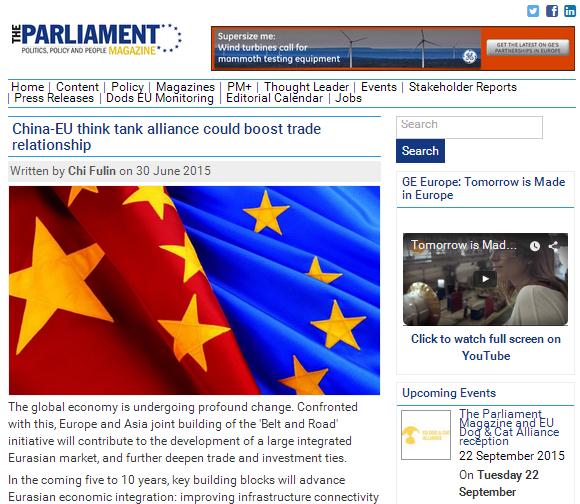
The global economy is undergoing profound change. Confronted with this, Europe and Asia joint building of the 'Belt and Road' initiative will contribute to the development of a large integrated Eurasian market, and further deepen trade and investment ties.
In the coming five to 10 years, key building blocks will advance Eurasian economic integration: improving infrastructure connectivity between the EU and China, completing the bilateral investment treaty negotiations, and moving towards a free trade agreement (FTA).
If the two sides were to agree on an ambitious FTA, it could give a boost to annual trade of up to nine per cent which could reach €0.89 trillion by 2020.
By the end of the decade, on the condition that China's foreign trade in services reaches €1.07 trillion and that the share of service trade in the total China-EU trade rises from 13.2 per cent in 2013 to 20 per cent in 2020, the total volume of service trade between the two sides could be as large as €200-€220bn.
The 'Belt and Road' initiative expands the possibilities for cooperation between think tanks in the EU and China. This collaboration between EU and Chinese think tanks could have an important role to play in constructing this initiative.
First, they could play a unique role in promoting macro policy coordination and supporting policymaking.
Second, they could enhance people-to-people ties and promote consensus for implementing the 'Belt and Road' initiative.
An important role of think tanks is to identify trends before they become mainstream and to guide and influence public opinion as well as policymakers.
Finally, they could play a unique role in undertaking independent research on the potential benefits of a China-EU FTA. Building a China-EU think tank alliance will provide intellectual support for construction of the 'Belt and Road'.
To address the global challenges they each face, Europe and Asia need to join hands in building and promoting trade and investment liberalisation across Eurasia.
This is why we need EU and Asian think tanks to work together. I would hope that if such an alliance can be established, it would lead to further platforms and mechanisms such as an annual China-EU think tank forum on the 'Belt and Road'.
There is also scope for joint research projects and cooperation programmes, while the alliance could, finally, provide consulting services for those directly involved in the building of an integrated Eurasian market.
Think tanks in both China and the EU could start joint studies of the feasibility of the proposed China-EU FTA as early as possible.
On the basis of in-depth analysis of the megatrends in the world economy and global trade, as well as the potential of investment and trade cooperation between China and Europe, think tanks could submit policy recommendations to their respective governments.
About the author
Chi Fulin is president of the China institute for reform and development
